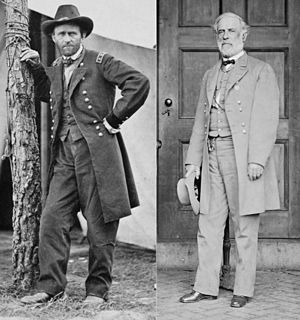Appomattox Campaign
| Appomattox Campaign | |||||||
|---|---|---|---|---|---|---|---|
| Part of the American Civil War | |||||||
 Ulysses S. Grant and Robert E. Lee, opposing commanders in the Appomattox Campaign. |
|||||||
|
|||||||
| Belligerents | |||||||
|
|
|
||||||
| Commanders and leaders | |||||||
|
Ulysses S. Grant George G. Meade Edward Ord Philip Sheridan |
Robert E. Lee |
||||||
| Units involved | |||||||
| Army of Northern Virginia | |||||||
| Strength | |||||||
| 114,335 | 40–45,000 | ||||||
| Casualties and losses | |||||||
| 10,780 | Entire confederate Army of Northern Virginia disbanded: Gen. Lee's surrender at Appomattox Court House (April 9). | ||||||
Decisive Union victory:
The Appomattox Campaign was a series of American Civil War battles fought March 29 – April 9, 1865 in Virginia that concluded with the surrender of Confederate General Robert E. Lee's Army of Northern Virginia to the Union Army (Army of the Potomac, Army of the James and Army of the Shenandoah) under the overall command of Lieutenant General Ulysses S. Grant. In the following eleven weeks after Lee's surrender, the American Civil War ended as other Confederate armies surrendered and Confederate government leaders were captured or fled the country.
As the Richmond–Petersburg Campaign (also known as the Siege of Petersburg) ended, Lee's army was outnumbered and exhausted from a winter of trench warfare over an approximately 40 mi (64 km) front, numerous battles, disease, hunger and desertion. Grant's well-equipped and well-fed army was growing in strength. On March 29, 1865, the Union Army began an offensive that stretched and broke the Confederate defenses southwest of Petersburg and cut their supply lines to Petersburg and the Confederate capital of Richmond, Virginia. Union victories at the Battle of Five Forks on April 1, 1865 and the Third Battle of Petersburg, often called the Breakthrough at Petersburg, on April 2, 1865, opened Petersburg and Richmond to imminent capture. Lee ordered the evacuation of Confederate forces from both Petersburg and Richmond on the night of April 2–3 before Grant's army could cut off any escape. Confederate government leaders also fled west from Richmond that night.
...
Wikipedia
